|
|
| VIEWS FROM THE STREET |
 |
|
THE THERAPY OF BEAUTY |
Added: Saturday 31st January 2015 |
I've lost track of the number of visitors to Powdermill whose conversation included, "I love visiting this place even when I don't catch anything. Such a
beautiful location."
I also understand that more than one angler's ashes have been scattered across Powdermill waters. Why? Presumably a final farewell to beauty, an incorruptible
innocence they once enjoyed.
Beauty is the connection. It's a bait, a fly if you like to catch and draw us into wonders that have remained unrealised. Visible beauty, in nature, character,
children and art, can soothe and pacify. It pours cream on shattered nerves and diminishes the weight of dark moods. Perceived beauty nudges anglers to idle away
summer hours outside of the Powdermill fishing hut; sipping coffee, exchanging conversation and "just looking!" Incidentally, I've noticed on the east side of the
lake that some deceased person has bequeathed a wooden bench to Hastings Fly Fishers Club. No doubt in memory of idyllic days of woods, water and kindly
Powdermill summers.
Beauty wields strange and pleasant influences on sensitive, open-minded people. Unfortunately, it ebbs and flows like ocean tides. One day you feel 'it' the next
you don't. That's the nature of beauty or at least its influence on us. Independent of sickness and health, happiness and grief, beauty is allusive and unpredictable
in its visitations. I'm sure you know what I mean. One moment it feels impossible to be thrilled about anything, the next we inwardly sing at beauty that's worth
displaying on a mantelpiece. At some time or another we have all sensed attractions to surrounding sights and sounds. Men who don't like landscapes are rare. Men
who fail to respond to a beautiful woman are even rarer.
Our perception of beauty contradicts all material laws. It comes and goes with a whimsical determination of its own. As I earlier remarked, one day we were touched
by it, another day we couldn't see it even though it stared us in the face. My point is, when we become aware of something beautiful we must not constrain its
unsought enjoyment. Thankful when it comes and acceptance when it withdraws. Importantly, as with all pleasures and interests, if appreciation of nature cannot
be acquired at whim, it's certainly assisted by regular practises of looking, observing and inwardly interpreting what it is saying to us.
Fly fishermen have an advantage over many people; we have priceless opportunities to be alone. Time to think, feel and savour the countryside beauty around us. While
not fleeing the obligations of society, for the present moment we are not dependent on them. Thoughtful opportunities are presenting themselves to watch swallows chasing
across glittering water, primroses running down banks, the architecture of trees and that skein of ducks flying into crimson sunsets. Crazily, I love to sprawl on the
grass just to watch clouds embedded in that childhood blue.
Annually, we are privileged to be surrounded by the cycle of the seasons. The girlishness of Spring, sensuality of summer, secrets of autumn and severity of winter. With
quiet perceptiveness and openness of eye, a sense of wonder can grip us. A mysterious depth of satisfaction. A yearning for we know not that is evoked by beauty that captivates
us. Simple things observed a thousand times suddenly cast spells on our inner spirit. Something new that is sweet and other-worldly beckons for our attention. There's nothing
religious about this. Anybody can experience it. Atheists, religious believers and non-believers alike are tapping into sensed wonders and felt beauty that can never to
be defined in precise terms.
There is an enviable influence behind all beauty that we see. Behind the wind that we hear, the wildlife we observe, the sunsets we admire. Sights and sounds become necessary
sustenance feeding our deepest spirit even though we weren't aware that we needed anything. B.B the nature writer made the brilliantly 'mad' suggestion that, "Once we are begging
to seek and search it may even be that in some measure, if not full measure, health will return to us. Nature has cures which are unknown even to the cleverest doctors, and the
power of the will is a potent power which sometimes fills us with awe and wonder." 1. In other words, nature becomes a gentle emotional healer.
Another 'mad' man, William Blake, in one of his wild, half-inspired utterances, went even further. He announced that a person's hope of immortality depended not upon virtuous
behaviour but upon wise perception.
A great contrast to recorded events in Yung Chang's best selling book, "Wild Swans." Yung describes the terrible suffering that she and her parents experienced during the Chinese
leadership of Mao Tse Tung. The final act of communist lunacy occurred when an order was received that flowers and grass were a distraction to belief. They were not useful to a
communist system. Yung Chang and her friends were forced to pull up all the grass and flowers from the school garden.
As well as blissful days at Powdermill lake, maybe we all, quite unknowingly during our fishing, stand (or sit) on the verge of grasping nature's momentous secrets. By simply
looking, contemplating, drinking-in and staying curiously childlike about natural beauty around us, enthralling things could gather and grow inside us. It's worth an attempt at
schooling ourselves. On the other hand, maybe I'm a silly old fool!
1. "Letters from Compton Deverell." by B.B.
PHIL STREETER
|

|
MAYFLIES |
Added: Monday 7th July 2014 |
Mayflies, dancing deliriously above the shiver of departing rivers,
Enjoy the life-span of a single summer's day ~ skylarks longer,
Perhaps possessing broken memories of yesterday and even shadowy suspicions of half-hidden tomorrows.
But not the mayfly, who is unaware of what it is to be one.
We are the mayfly,
Flitty and giddy in the brittle charm of the moment:
Oblivious of anything beyond the glitter of earth's passing seconds and
Luxuriating our brief lives through blue of morning, gold of noon and pink of evening.
It's a case of more beautiful the day, the more poignant it's demise.
Greater the ecstasy, sadder it's brevity.
|

|
THE GENTLE ART OF GROWING OLDER |
Added: Sunday 25th May 2014 |
Hardly a week passes without confronting a tree and thinking, "Perfect! Plenty of connecting branches. I could climb this one." After
all, in my bare-kneed youth I scrambled up countless Beech trees looking for Jackdaw's eggs. How maddening having youthful energy in the
head but unable to transfer it to the limbs. As someone brilliantly observed, "The tragedy of growing older is the remaining young." In
other words, the spirit doesn't age as quickly as the body. Nevertheless, acceptance of our state helps us grow older in more serene and
acceptable ways; to reach levels of contentment and acceptance in the autumnal years of our lives.
Hopefully, as we age physically, attitudes and objectives will also alter - a sort of helpful gear change as we begin motoring down hill. There
will of course be accompanying regrets that we struggle to come to terms with. Nauseating losses like...
"If only I could kick a football around like I used to."
"Once upon a time I could jump on a bike and ride it for miles."
"The hills in Hastings get steeper and steeper."
"Dammit. Sadly no more second glances from pretty girls."
Such sentiments must remain bravely born miseries. Conversely, when it comes to leaving youth behind, I really don't want to be dragged screaming
and protesting from the scene clutching posts and door handles. How embarrassing for younger members of the family when they see mutton striving
to remain lamb. When older fathers desperately compete with stronger sons. Oh dear! Keep in mind that we may run but we can't hide from the
consequences of age.
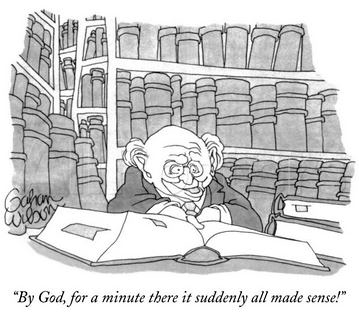 There are tremendous
gains in growing older. I recall my own youth which was one of nauseating shyness and reserve. Always a painful awareness that
I seemed to have nothing constructive to say, and the worse agony of having stupidly said the wrong thing! Marie Bashkirtseff in her journals wrote
that whenever she entered a room she muttered a desperate prayer, "O God, please make me worth seeing." I was just as frantic, eyeing myself as an
average person attracting little or no attention. On reflection, maybe there were secret motives of impressing people in areas where I wasn't really
able. Now, with the passing of the years, I'm happy enough to be tolerated. In every subject of life (particularly fly-fishing), I no longer shrink
from saying, "Sorry, I don't know," suspicious as I am that only as one realises and learns, one matures and deepens. There are tremendous
gains in growing older. I recall my own youth which was one of nauseating shyness and reserve. Always a painful awareness that
I seemed to have nothing constructive to say, and the worse agony of having stupidly said the wrong thing! Marie Bashkirtseff in her journals wrote
that whenever she entered a room she muttered a desperate prayer, "O God, please make me worth seeing." I was just as frantic, eyeing myself as an
average person attracting little or no attention. On reflection, maybe there were secret motives of impressing people in areas where I wasn't really
able. Now, with the passing of the years, I'm happy enough to be tolerated. In every subject of life (particularly fly-fishing), I no longer shrink
from saying, "Sorry, I don't know," suspicious as I am that only as one realises and learns, one matures and deepens.
Another satisfaction about growing older, is the decreasing tyranny of having to follow rules! Once upon a time, sheep-like, I followed what others
said and the political games they played. Now, I can't be bothered. To be called a heretic as I sometimes am, is a compliment. Neither do I mind being
classified a rebel as long as I'm a nice one. Who says we must write on straight lines and keep paint within squares? Forget it, age is on our side. We
can do anything we like - well, nearly anything! As well as bus passes, we have licenses giving us permission not to bother over-much. To learn how NOT
to do things. If my standards appear lower than they used to be, hopefully I'm a more kind, sensitive and compassionate person because of it. These days
I tend to hold my tongue, try not to score points in conversation, and run away with haste from people's pomposity. The important thing is to "be
ourselves." To enjoy who we are, for unless a person is interesting to themselves they cannot be interesting to others.
A further gain of advancing years is whereas youth had its impetuosity and adventures, at the same time it was quick to plunge into discouragement and
despair. Hopefully, with age, gentler emotions swing into view. When the hot blood has cooled a little, a more serene and interesting outlook replaces
it. A subdued insight and good-natured lounging. A tolerance and broader range of experience. In youth we could convince the world. Now we see that
overnight the strongest leaders become grass scattered by the wind.
Maybe you're like me. These days I tend to demand less from society and much less from individual people. I value good conversation and treasure friendships,
old and new. I never refrain from asking for advice, especially as a fly-fisher - not a very good one I would add. After fifteen years of hurling flies into
the water, I'm still asking questions like, "What fly should I use?" "How long should my leader be?" "Where should I tie the dropper?" One aspect of
increasing years is that I'm no longer reluctant about showing my ignorance. After all, we all want to add to our knowledge and we all possess skills that
differ from our friends.
Probably the greatest gain in growing older is the arrival of what I can only describe as a particular kind of patience. Maybe your wife or partner would
aggressively disagree! In youth, mistakes seemed irreparable, calamities intolerable and disappointments unbearable. Anxieties hung around like threatening
storms and every silver lining contained a cloud. While I was a hovering dragonfly reluctant to settle, at this period of life, I'm learning something of a
"so what" attitude. Anxieties eventually fade. Catastrophes often have compensating pleasures. The wisdom of advancing years helps us to look over the top
of problems instead of inside them, and with determination we might even create something out of our failures while becoming increasingly tolerant of the
failures of others.
For myself, I juggle the benefits of growing older with the buzz of youthful thinking. While not always successful, I endeavour to live for today, allowing
each one to fall away when it's done. A gnawing suspicion being that serenity in old age probably depends on claiming nothing, not griping about "my rights," and
being thankful for all I have. I don't want to grumble about youthful morals, politics and the quality of brown ale. Furrows on the brow and anger in the eyes
can be dreadful in their strength. My earnest wish is to grow old patiently and bravely, disgracefully and joyfully. To enjoy everything and everybody when
they arrive - sunshine, rain and the capture of a double figure Rainbow trout the possibility of which seems as remote as standing on tiptoe to grab a handful
of stars.
PHIL STREETER
|

|
ANOTHER WARNING FROM THE EDITOR |
Added: Friday 25th April 2014 |
 Yet again,
before you face Phil’s latest deep thoughts, your editor feels the need to forewarn you. Having done a fair amount of name dropping
in his first article, Phil has managed to add yet more in his second. So take care or you could be overcome by the plethora of famous writers
such as Alfred Lord Tennyson, Graham Greene, Jean Paul
Sartre, D. H. Lawrence, Joanna Trollope, William Wordsworth and J R Tolkien (not specifically
mentioned). Then suddenly we get a new angle on none other than Jesus! Wow, talk about covering a great deal of ground! Yet again,
before you face Phil’s latest deep thoughts, your editor feels the need to forewarn you. Having done a fair amount of name dropping
in his first article, Phil has managed to add yet more in his second. So take care or you could be overcome by the plethora of famous writers
such as Alfred Lord Tennyson, Graham Greene, Jean Paul
Sartre, D. H. Lawrence, Joanna Trollope, William Wordsworth and J R Tolkien (not specifically
mentioned). Then suddenly we get a new angle on none other than Jesus! Wow, talk about covering a great deal of ground!
OK, so we have all heard of Alfred, Lord Tennyson (1809-1892) who in 1854 wrote “The charge of the Light Brigade”. But did you know that James
Bosworth, one of the survivors of the ‘charge’ at Balaclava, was the Station Master at Northiam, just up the road from the reservoir. Ironically,
he was run over and killed by a railway engine at the age of 70. If you make the effort to find his grave in the cemetery in Northiam village you
will see that his epitaph reads as follows :-
Though shot and shell flew around fast,
On Balaclava's plain,
Unscathed he passed, to fall at last,
Run over by a train. |
Now as far as your reporter/editor is concerned, that really is interesting.
In 1960, as a fourteen year old schoolboy, I can remember the scandal and sensation surrounding the court case at the Old Bailey as a result of the
publication of the unexpurgated edition of D H Lawrence’s “Lady Chatterley’s Lover” published by Penguin Books. Yet over 50 years later, I have still
not bothered to read it, but I suspect that Phil has. However, I still love to re-read “Wind in the Willows” and “David Copperfield” to the
grandchildren. Simple pleasures for a simple man!
But for those of you with more sophisticated tastes and minds... read on.
|
ANTIDOTES TO BOREDOM
by Phil Streeter |
For the fly fisher, this early Punch magazine cartoon humorously presents us with a sizzling range of human emotions that we all
share. Frustration, boredom runaway anger; you name it, we all experience it.
We have all been inflicted with boredom. A tediousness that stops you getting up in the morning. A "wading through a sea of glue," bemoaned
the depressed Tennyson. Some people ride it out, others devise means of softening its impact, and everyone would be glad to be without it.
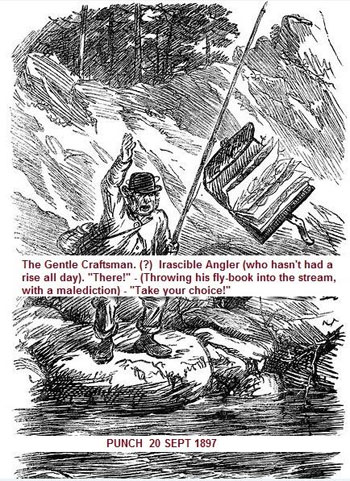 The writer
Graham Greene confessed to obsessive cravings for excitement. Feverishly living on the edge, he quickly became bored. Passing
a dentist one day feeling desperately lethargic, he suddenly decided to while away the time by having a tooth extracted. Reclined in the
dental chair, Greene warbled a fictitious story about an abscess under his tooth. "It must be extracted," growled the dentist. Greene
agreed on condition that he was knocked out for an hour by ether inhalation. Later, he described the experience as a "holiday from the
world." To him, a spell of adventure, a welcome antidote to ordinariness. The writer
Graham Greene confessed to obsessive cravings for excitement. Feverishly living on the edge, he quickly became bored. Passing
a dentist one day feeling desperately lethargic, he suddenly decided to while away the time by having a tooth extracted. Reclined in the
dental chair, Greene warbled a fictitious story about an abscess under his tooth. "It must be extracted," growled the dentist. Greene
agreed on condition that he was knocked out for an hour by ether inhalation. Later, he described the experience as a "holiday from the
world." To him, a spell of adventure, a welcome antidote to ordinariness.
Jean Paul Sartre in his reminiscences, recalls an Italian by the name of Giacometti, an unenviable man constantly griping about his boring
existence. "I was born for nothing," he groaned. One day while crossing a busy street, Giocometti was run over by a car. Prostrate on
the road, he confessed to a strange sense of elation. "At last something has happened to me," he murmured with a smile.
Aware that life's realities never equal one's ideal picture of them, D. H. Lawrence of Lady Chatterley fame, grizzled, "How I loathe ordinariness."
I must quote the person of Jesus from the New Testament but before doing so, I have to express my extreme irritation that this man has been
kidnapped by established religion. No, I'm not preaching! My own strand of spirituality is simply sensing an Eternal Presence in everything
and everyone, not in appointed buildings. This makes me a naughty, disobedient heretic, but I can't help it.! Originally, Jesus had nothing
to do with Church or institutional religion. People have made him religious and for this reason he needs rescuing from it. He was an inspiring
person just like Buddha, Mohammed, Mother Theresa and a galaxy of others that you could quote and maybe have even met.
Undoubtedly inspired, Jesus casually introduced a string of wonderful ideas that really could change the world. Sentiments like kindness, compassion,
peace, tolerance and forgiveness, that have nothing to with religious buildings. But back to my main point. Being a human being like us, he too
would have experienced boredom - that flat similarity of identical days. Sawing the same wood, nailing the same planks and up to his ankles in
the debris of the obvious. However, he never resigned himself to a dull existence in order to rid himself of monotonous feelings. It's more than
likely he practised alternative approaches to understanding the human problem of boredom. After all, dullness, sameness and repetition are essential
parts of life. Only through tediousness could he apply that which he believed into something everyone could practise. "To be happy," said novelist
Joanna Trollope, "you have to learn to value LITTLE THINGS."
In spasms of boredom, rather than feeling sorry for himself, Jesus diverted his attention to INCIDENTALS - to SMALL THINGS. They had value and were
a launch pad to ease his sense of boredom; to diminish his spasm of staleness. Small, random events like sparrows arguing on rooftops, corn stalks
in a field, flasks of wine, his mum baking bread, a pocketed coin, a lost sheep, a poor person in the crowd - a hundred everyday sights that regular
people like us take for granted. In fact anything to escape that humdrum flatness. "Look at the lilies," he suggested. Is that all? Where's the
trembling profundity? Maybe lilies like every other flower, when admired, become antidotes to boredom. They're certainly worth a glance when you're
feeling morbidly mundane. "Go sit among the rocks," said nature writer Richard Jefferies, "or in the depths of the wood, and think of immortality,
and all that word really means, and by-and-by a mysterious awe will creep into the mind, and it will half believe in the possibility of seeing or
meeting something - SOMETHING - it knows not exactly what." If every moment is a messenger and every object contains a message as I believe they do, then
the suggestion is that in miserable moods, it's worth mustering the energy to look around for distractions.
By accepting ordinary events rather than combating them, we permit them to mould our inside life instead of us becoming their prisoner. When we feel dull
and listless, when no fly seems to work (!) be assured that life's smallest incidents bristle with significance. Frequently, we cannot perceive this
because we do not notice. The wood can't be seen for the trees.
Boredom can be toyed and experimented with by extending our gaze towards the repetitious and commonplace. Previously unnoticed normality takes on new
shapes when time is taken to LOOK, SEE and FEEL, not necessarily to understand. Trivial incidents are excellent instructors, the mundane can become
marvellous, for that which is commonplace is always genuine. In that infirm person creeping along the street, two teenagers moodily romantic at a
bus stop, the welcome of warm smiles, the friendly offer of "Try this fly," the innocent stare of a child in advance of its ability to express itself, a
carpet of bluebells in a wood, a sheet of calm water silvered by moonlight, a loan tree leaning on the horizon, the sound of the first cuckoo. Ordinary
sights like the deep gaze of an old dog, that helpful assistant in Tesco, a mother gazing into her pram and so on. Suddenly, the ordinary becomes
transcendent! Or at least nudges us into realising that hundreds are worse off than us.
Behind all visible things looms a vastness; a window opening on everyday realities more majestic than they first appear to be. We must never reject
sentiments when they are aroused. Welcome them. Feel them. They are individual expressions of our unique temperament. "O gentle reader, you could
find a tale in everything," advised William Wordsworth.
The wise person welcomes ordinariness and monotony, boredom and irksomeness. When permitted, they can become experiments, entertainment, personal
theatrical performances and education rolled into one. Repetitive things we look at when we least feel like it act like fairy wands that transforms
things! Incidentals become as realistic as that first kiss and caress. Stale, ordinary occurrences can grasp a person. They prompt us to listen,
and then become a key by which we understand meanings in the drabness we are of scraping through.
Everything emotionally wooden and tediously monotonous are present in order to take on other meanings. Bliss, satisfaction, and a surprising awareness
can occur when we are seeking to find reasons for our flattened feelings. Be sure they are not opposites. Both are integral parts of an emotional
journey that we need to pay attention to. They are the substance about which Bilbo Baggins sang about in Lord of the Rings...
The road goes ever on and on
Down from the door where it began.
Now far ahead the road has gone,
And I must follow it if I can,
Pursuing it with weary feet,
Until it joins some larger way,
Where many paths and errands meet,
And wither then?
I cannot say. |
So, first boredom, afterwards curiosity followed by fascination, then the pleasure of understanding. When welcoming our incidentals simply for what they
are, realisations to difficult to analyse can easily gather and grow inside of us. So, at least have a try! Take a look! Remember that diseases are not
healed by repeating the word "medicine" but by taking it. Then, quite mischievously, boredom could become the midwife for the birth of an unexpected self-discovery.
I conclude, optimistically wishing you the dullest, boring day of your life!
Phil Streeter
|

|
ALL YOU REALLY NEED TO KNOW AND MORE! |
Added: Tuesday 1st April 2014 |
We did warn you that it would not be an easy read. This article has created more controversy and comment than anything else
that has appeared on the HFF website. Your Editorial team are ecstatic. The Hans Christian Andersen tale "The Emperor’s New
Clothes" comes to mind.
However, for those of you who may be completely confused, your editorial team can honestly assure you that our Phil is not a
nutcase, just a deep thinker whose thought processes are invariably far from straightforward. Your intrepid reporter had an
acquaintance that had studied philosophy at Oxford and he has to admit to being completely unable to hold a conversation with
him on his lifelong passion.
For those of you who have tried and failed to plough through Phil Streeter’s defence of ‘laziness’, you have our sympathy as
it’s not easy going! For those that claim that they did, but knew nothing about those ‘notables’ mentioned in Phil’s article,
the Editorial team are happy to provide you with their assessment for what it’s worth:
Meister Eckhart (1260-1327) was in actual fact Eckhart von Hochheim, but apparently was born Johann Eckhart. Confused? So are
we! Meister simply means "the Master" and we have no idea who gave him this accolade. He was a Dominican preacher, theologian
and mystic, born at Hochheim, not far from modern day Frankfurt. You will be reassured to hear that anything written around
this time is incomprehensible to normal people! This partly explains why Phil regards him so highly.
A.C. Benson (1862-1925) was an author, diarist and poet who became master of Magdalene College, Cambridge. The only thing that
should endear him to you is that he wrote the lyrics to Elgar’s “Land of Hope and Glory”.
Viscount Grey of Fallodon (1862-1933). Your Editorial Team consider that Sir Edward Grey, was partially responsible for Germany’s
ultimate aggression resulting in WW1, which may not have occurred but for his inept diplomacy. As a reward for his incompetence
he was kicked upstairs by being created Viscount Grey of Fallodon and then became leader of the House of Lords. He was famous
for uttering the statement "The lamps are going out all over Europe; we shall not see them lit again in our lifetime." So he
did manage to get something right!
Richard Jefferies (1848-1887). He is described as an English nature writer. Now, here is someone whose books we all could benefit
from reading, understanding and even enjoying. We assure you that this can be achieved with only a little effort. We recommend
two of his books to the aspiring modern countryman. The first is “THE GAMEKEEPER AT HOME” and the other “THE AMATEUR POACHER”.
Shooting pike when up trees– now that’s different!
Andre Gide (1869-1951) was a French author and winner of the Nobel Prize in Literature in 1947. Your Editorial team love so many
of his sayings that it is difficult to choose just a few, but here are four of our favourites:
"Everything has been said before, but since nobody listens we have to keep going back and beginning all over again."
"Believe those who are seeking the truth. Doubt those who find it."
"One does not discover new lands without consenting to lose sight of the shore for a very long time."
"It is better to be hated for what you are than to be loved for what you are not." |
Katherine Mansfield (1888-1923). Born in New Zealand, but moved to London at the age of nineteen. A writer and very ‘modern’ lady
for her time. We cannot claim to have read any of her works. Given her apparent racy lifestyle that’s just as well! So what’s
Phil’s explanation?
|

|
THE BLISS OF IDLENESS |
Added: Thursday 27th March 2014 |
Walking along a South American seashore, a rich and successful
business man came across a man propped against his fishing
boat in the sunshine.
"Hi!" said the business man. "Finished for the day have
you?"
"Yes," sighed the man contentedly.
Contemplating the fisherman for a moment, the business man
retorted. "You don't seem to be working very hard. If you
put more effort into your job, I think you could become
rich and successful just like me."
The fisherman picked up a small net lying on the sand beside
him and commenced repairing it.
"Can't you see," reflected the business man. "If you worked
an entire day fishing instead of the few hours that you
do, you would catch more fish. Then you would earn more
money. With more money you could purchase a bigger boat.
In fact, with increased income you might even be able to
buy a fleet of boats and employ staff."
"What then?" Said the fisherman stuffing tobacco into a
little pipe.
"Don't you understand," insisted the business man irritably,
"You would become successful and happier."
"But I'm happy now," was the simple response. |

Reverend Philip E. Streeter |
Unemployment
can't be acquainted with idleness. To insist
that working and earning is a responsible, moral obligation
is questionable. It's reminiscent of landowners demanding
peasant obedience, the master's control over servants; both
having little connection with the bliss of being human.
Why should idleness be regarded as shameful? It has profound
value because provision is being made for reflective thought;
for contemplation outside of standard opinion and programmed
belief. I think we should idle around a lot more. Yelled
warnings about "shirking responsibilities" and "never lifting
a finger to help humanity," are best ignored. "You should!
You must!" rather than a warm, soupy, "Will you consider
this?" is little more than a gun held to the head.
In pushing prejudices and principles on others, the accusers
indulge in a kind of idolatry. Of course work is a vital
fragment of life, just as the psychological trauma of job
insecurity can be crippling, but bigoted opinion without
knowing all the circumstances is like someone obsessed with
collecting butterflies that they refuse to catalogue and
display.
"I work hard, fulfil my obligations and so should you."
Such statements have a duff ring of self-righteousness.
They are miserable attempts to push people into a morbid
guilt totally out of proportion with their (so called) idleness.
"People ought not to consider what they are to do as what
they are," scribbled 14th century mystic, Meister Eckhart.
"Let them be good and their ways and deeds will shine brightly."
Of course there's always someone who will abuse the system.
The skivers who channel little if anything into society,
but fractures occur in every facet of life. While an individual
may not be employed, this doesn't mean they are unoccupied
or are non-contributors. There are good, unemployed people
helping to bring order to the universe. While appearing
to do nothing, they quietly perform that which rings right
with a clear conscience. Hearts are extending further than
hands. They are productive in discreet, sensitive ways in
contrast to the brashness of the energetically organised.
Instinct is their guide. Their moment by moment responses
suggest that beautiful, permanent things are usually the
unnoticed not the demonstrative.
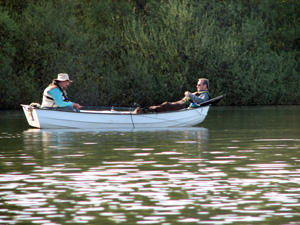
Idleness |
Of course we need an occupation but not necessarily standard
images of what an occupation is. Slumping out of our beds
to put on the obedience of another day becomes little short
of oppressive if we have been pushed into unsuitable employment.
All work that is not pleasurable is wretched. Social obligation
and the villainy of deadlines never justify the fuss they
create. There's never a clear-cut "should" or "should not"
as Isa al Faris the Sufi found out. He was called "the piercer"
because he had the boring job of constantly piercing beads.
When asked, "Why do you continue to do this job?" he replied,
"I keep busy with this so that they won't make me busy with
something else."
Everyone
hankers after employment fitting with their interests
and giftings. Doing what they want to do rather than what
they have to. In an imperfect society this isn't always
possible. Inevitably, individuals become stressed and unfulfilled.
Work becomes an invading dullness because nothing they do
appears to be of value.
There are also the hyper-sensitive and thin skinned who,
through no fault of their own, have lived a sheltered existence.
Fearful individuals that make little headway in rough, cynical
work places. Sensitivity of temperament linked to nameless
dread, produces an inability to cope with harsh demands
made upon them. Such people can't help responding over-intensely
to the stabs of life. If only we could do the things we
want to do, traverse the areas we dream of exploring and
be provided with opportunities to do so. After all, none
of us can help being who we are.
For some, gifted abilities in music, painting, creative
thought, instructive hobbies and practical caring, the sharing
of inherent wisdom and a sense of wonder, together with
gifted abilities to listen and discuss in warmest conversation,
could become valuable sources of soothing healing. Such
ignored people have a unique vision of the world. Their
valuable contribution to others is due to the fact that
they refuse to dot their i's and keep paint between the
lines, as officially instructed.
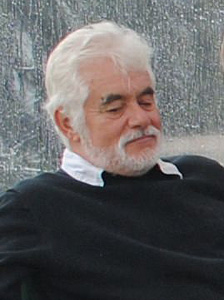
Idleness |
Everyone needs leisure time in order to arrive at important
solutions; to come to clear conclusions, to imagine and
romanticise about the miracle of existence. Life's deepest
lessons are not learned in hard work, doing and obeying,
but in BEING. Such leisurely people are the real experts
and specialists. "Some of the most useful people I know,"
wrote A.C.Benson, "are people who think least about being
useful ... They have time to listen and to talk, to welcome
friends and sympathise with them, to enjoy and help others
to enjoy. They seem to me to do more for the world than
the people who hurry from meeting to meeting."
Sadly, there's a galaxy of sensitive, gifted people who,
in anguish, see all the promises they made for themselves
drown in oceans of duty and responsibility. "The longer
we live," said our good fishing friend Viscount Grey of
Fallodon, "the deeper becomes the groove or the rut in which
our life moves."
More idleness is needed. More opportunity to waste time.
Moments when we all rise above obligation, regularity, compulsion
and the expectations of others in order to be saturated
by life's novelty and motiveless variety.
Nature writer, Richard Jefferies longed to be free from
the pettiness of useless labour. "I hope," he wrote, "that
succeeding generations will be able to be idle. I hope that
nine-tenths of their time will be leisure time; that they
may enjoy their days, and the beauty of this wonderful world;
that they may rest by the sea and dream; that they may dance
and sing, and eat and drink. I will work towards that end
with all my heart."
Around the same period, French writer Andre Gide babbled
similar sentiments in a more sensuous way. "Every perfect
action is accompanied by pleasure. That is, how you can
tell that it was right to do it. I don't like people who
pride themselves on working painfully. If their work was
painful, they had better done something else. The delight
one takes in one's work is the sign of its fittingness."
Replaced by method and regulation, policy and obligation,
the senses easily become disciplined to exclude attributes
like playful nonsense, runaway imagination, idle fancy,
the pleasures of sampling, fantasy, risk, sacred idleness
and serendipity - that gift of discovering gilt-edged things
not even sought after. Or even to drift along with life's
flow waiting for things to work out as they generally do.
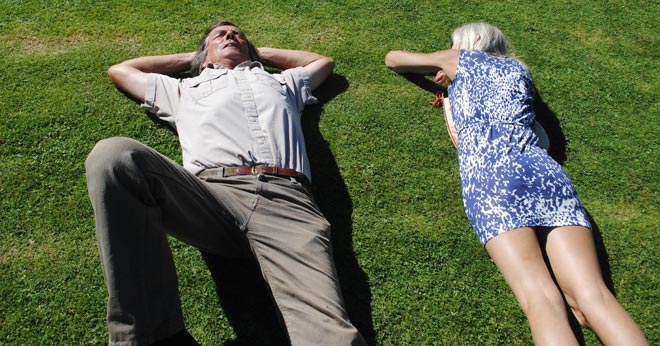
Idleness |
This is not negligence, laziness or indifference, but a
touching awareness brooding over a sense of fun; of not
taking anything over-seriously, especially ones self. That
even the worst stays best if it's sincere. It's something
like the adult suddenly perceiving in the child a wit and
insight sharper than their own.
Many resist an idle easiness. It leaves no successes to
boast about. Yet how profitable to neglect responsibilities
and waste time. It's no worse than strategic efforts greedily
prompted by self-interest. Personally, I think that one
of our greatest human charms lies in our useful idleness,
after all, we were born not quarried. Doing something 'useful'
never compensates "Let me alone, I want to think." Maybe
there's more justification for reflective leisure than for
'successful' careers; to love your neighbour than make a
fortune. Time must be made for dalliance. Matters need to
be taken more lightly, even the concept of work. "I don't
want to earn a living," wrote Katherine Mansfield, one of
my favourite writers, "I want to live!"
That's it! Little organised action and more reflection.
Less productivity and more standing and staring. Cats are
brilliant at staring at the moon. Herons stand still as
statues. We seem to lack that ability. Haven't you found
that it's often the individual sitting on the back seat
doing nothing, that is the wise, inspiration-giver?
Every month the disciple faithfully sent his master an account
of his spiritual progress. In the first month he wrote,
"I feel an expansion of consciousness and experience my
oneness with everything." The master glanced at the note
and threw it away. The following month the disciple said,
"I have finally discovered that the divine is present in
all things." The master was disappointed. In his third letter
the disciple enthusiastically explained, "The mysterious
secret of the universe has been revealed to my wondering
gaze." The master yawned.

Idleness |
After that a month passed by , then two, then five, then
a whole year. The master thought it was time to remind his
student of his duty to keep him informed of his spiritual
progress. The disciple wrote back, "Who bloody cares!" When
the master read these words, a look of satisfaction spread
across his face. He gurgled, "Thank God. At last he's got
it!" A detachment of mind - a sense of freedom - the blessing
of the careless. Brilliant!
To quote Viscount Grey once again: "Feelings of delight
come unsought and without effort - when they are present
they are everywhere about and in us like an atmosphere;
when they are past it is almost as impossible to give an
account of them as it is of last year's clouds, and the
attempts to analyse and reconstruct the sense of joy that
has been and maybe again, seems to result in rows of dead
words."
I love this throw-away suggestion of pleasure and 'can't-be-bothered
idleness.' He's the sort of chap who would persuade us all
to crowd idly into the fishing hut as often as possible;
dump our tackle against the wall, brew a cup of coffee and
lustily sing...
"Busy doing nothing, working the whole day through.
Trying to find lots of things not to do.
We're busy going nowhere, isn't it just a crime,
We'd like to be unhappy but we never do have the time."
PHILIP E. STREETER
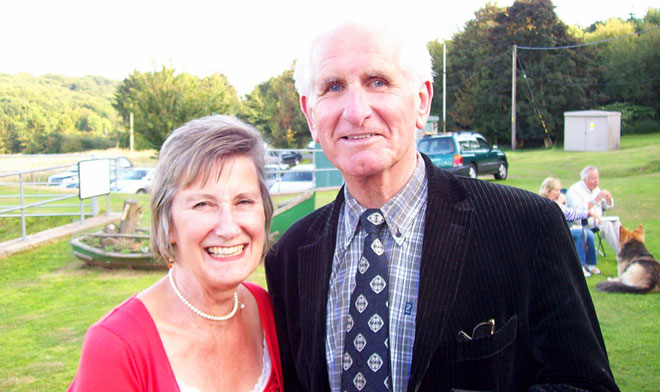
Diane and Reverend Philip E. Streeter |
|
|
 |






